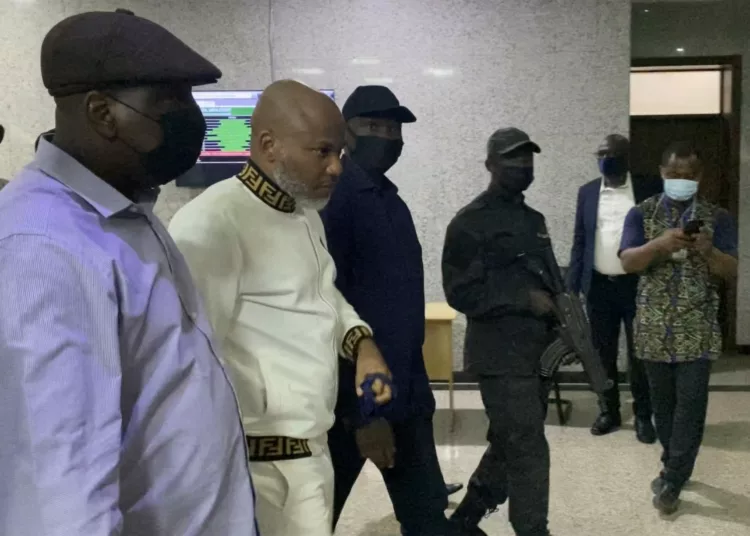Federal government has said the leader of the Indigenous People of Biafra (IPOB), Nnamdi Kanu, is a threat to national security and a flight risk with the capacity to flee the country before the determination of its appeal against the October 13 judgment of the Court of Appeal.
A lawyer for the federal ministry of justice, David Kaswe, told the court while arguing before the court on an application by FG for the stay of execution of the court’s October 13 judgment which discharged the terrorism-related charge on which Kanu was being tried.
Kaswe said, “The application was brought in the interest of justice and to preserve the security in the South East and the country.
“We have demonstrated that the respondent (Kanu) is a flight risk. If the judgement does not stay until our appeal is heard and determined by the Supreme Court, it will be difficult for us to lay our hands on the respondent to bring him back to court to face the charge against him.
“The respondent has shown that he has the capacity to jump bail,” he said.
Kaswe added that should Kanu be released from custody, it could impact negatively on the security situation in the South East.
He said should the judgment be executed now and Kanu released, it would negatively impact national security, particularly as it relates to the South East.
Kaswe prayed the court to grant the sole prayer in the application in the interest of justice and unity of the country.
Responding, Kanu’s lawyer, Mike Ozekhome (SAN) accused the federalgovernment of being in contempt of court.
Ozekhome argued that the federal government filed its application to overrule the judgement of the court.
He claimed that the attorney-general of the Federation (AGF) had boasted on many occasions that the government would not obey the judgement.
Ozekhome argued that as against the government’s claim, Kanu’s release would bring peace and tranquility to the South East and the country.
He added that the application by the federal government was to stay the execution of Kanu’s liberty and urged the court not to indulge the government.
Ozekhome contended that there was no valid appeal by the federal government at the Supreme Court, noting that the court could not stay execution when there was no valid appeal.
He prayed the court to dismiss the application.
Ozekhome earlier told the court that his client was ill and needed to undergo an operation and urged the court to insist that the government complies with its judgment.
At the conclusion of the lawyers’ submissions, Justice Haruna Tsanami, who presided over the three-member panel that heard the application, said the ruling was reserved till a date to be communicated to the parties.





